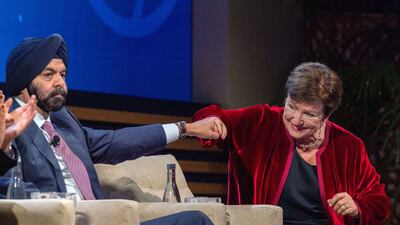The world needs to come together, end the culture of pointing fingers, tap every pool of available resource and adopt innovative financing solutions to accelerate climate change mitigation efforts, the heads of the World Bank and the International Monetary Fund have said.
Solutions including a voluntary carbon market as well as mobilising private sector financing should be prioritised, as the world is running out of time in its bid to achieve its climate goals, Ajay Banga, president of World Bank, and Kristalina Georgieva, managing director of the IMF, said during a panel discussion on Wednesday.
With stretched finances and a higher interest rate environment, governments alone do not have the financial muscle for all that is required for mitigation and adaptation.
“All this comes from the fact that if all this money is required to get mitigation or adaptation [going], then where's it going to come from? It cannot come from government coffers,” Mr Banga told delegates on the sidelines of the IMF and World Bank annual meetings in Marrakesh.
“It's not going to come from only the multilateral development banks, no matter how much I would like to believe that we are the solution to everything. All of us put together, our balance sheets and our capacity is up to a certain amount, very valuable, but not enough.”
Part of the solution is mobilising capital from the private sector. However, that is time-consuming process as private sector investors face risks including political volatility, sudden change in regulations as well as foreign currency fluctuations.
The financing needed to meet global adaptation and mitigation goals is estimated at trillions of dollars annually until 2050. However, only about $630 billion a year is being spent currently around the world, with only a fraction of that amount going to developing countries, IMF deputy managing director Bo Li said in February.
Emerging market and developing economies will require substantial investment to mitigate climate changes, 80 per cent of which will have to come from the private sector, for these countries to achieve their net-zero emissions goals by 2050.
Emerging and developing nations, which currently emit about two thirds of greenhouse gases globally, will need about $2 trillion annually by 2030 to reach their climate targets, the IMF said in a report in earlier this month, citing International Energy Agency estimates.
The projected investment is a fivefold increase from the current $400 billion of climate investments planned over the next seven years, and the majority of the required funding needs to flow into the energy industry, the Washington-based fund said at the time.
The World Bank president, however said “we should be careful how much we tout the private sector as a solution”.
“In terms of pace, I believe it takes time, because these things don't change overnight,” added Mr Banga, who had a long corporate career and was chief executive of MasterCard before taking the helm of the World Bank.
The world currently spends about $1.25 trillion on subsidising fuel, agriculture and fisheries, which in turn have an environmental impact of between $5 trillion to $6 trillion a year, and withdrawing some of those subsidies could free up resources for climate action.
“I'm not saying you can get rid of all of those. I consider some of those subsidies mission critical for the social contract between a government and its citizens, [but] I don't believe that $1.25 trillion qualifies” for these subsidies, Mr Banga said.
Another solution, he said, is a carbon credit market, where credits are certified from the World Bank for countries and corporations and greenwashing is minimised.
“If we get this carbon market going with the certification from the bank, that is [going to be] a true check of green credit, meaning nobody's deforesting here and reforesting there and trying to greenwash,” he said.
Ms Georgieva called for the world to come together and deal with problem at hand rather than continuing the blame game.
“We need to work together … and basically get governments to remove barriers for private sector participation, then we would see it happening,” she said.
“Above all, we need to move from the culture of pointing fingers to the culture of holding hands. We are in this together.”
As a financial institution, the IMF puts its money “where our mouth is” and has created a resilience and sustainability trust, whose members receive allocation through special drawing rights.
“It is about $40 billion strong today, 11 programmes already in one year in place and six of them on the continent of Africa,” Ms Georgieva said.
















